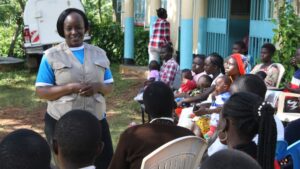“Love Trumps Hate.”
“Tweet Us With Respect.”
“Keep Your Laws Off My Body.”
“I’ve Seen Sturdier Cabinets At Ikea.”
“I Didn’t Flee Hitler for This S__T!”
These were just a handful of the pointed messages on protest signs that an estimated 3.3 million women carried at marches across the country last Saturday in response to President Donald J. Trump and his administration, just a day after the billionaire businessman and celebrity TV star took office.
Marchers — many of whom sported the pink hats with cat ears that have become a symbol of the anti-Trump movement — pledged solidarity with marginalized populations. These groups, including women, immigrants, Muslims, people of color, people with disabilities and LGBQ Americans, say they fear their civil rights may be violated under the Trump administration.
Jewish women, and some Jewish men, from the Baltimore metropolitan area were well-represented, both at Charm City’s “sister march” and the march that birthed all the others, the Women’s March on Washington, which was estimated to have drawn approximately 500,000 protesters.
 They traveled by cars, trains and buses chartered by synagogues and social justice organizations to arrive in the nation’s capital in time for a rally and march that featured speeches by such veteran activists as Gloria Steinem and Angela Davis; politicians like Rep. Maxine Waters (D-Calif.) and Sen. Kirsten Gillibrand (D-N.Y.); and such celebrities as singer Alicia Keys, filmmaker Michael Moore, pop icon Madonna and actress Scarlett Johansson.
They traveled by cars, trains and buses chartered by synagogues and social justice organizations to arrive in the nation’s capital in time for a rally and march that featured speeches by such veteran activists as Gloria Steinem and Angela Davis; politicians like Rep. Maxine Waters (D-Calif.) and Sen. Kirsten Gillibrand (D-N.Y.); and such celebrities as singer Alicia Keys, filmmaker Michael Moore, pop icon Madonna and actress Scarlett Johansson.
Chizuk Amuno congregants Randi and Andy Miller, who live in Owings Mills, came to the D.C. march with Randi’s mother, Gerri Kobren, a member of Baltimore Hebrew Congregation. They traveled on one of two buses chartered by the Baltimore branch of Jews United for Justice, an organization committed to community-based social action.
Randi Miller, 56, a psychologist, said she attended the march because she is “desperately worried” about the Trump administration’s course of action for the nation.
“I feel that the administration is inexperienced and uneducated about the complexities of the world,” she said. “Trump leads with his ego, and I don’t think he has the country’s best interests at heart.”
Andy Miller, 57, a real estate settlement officer, said he was marching primarily because of his concerns about the future for his two daughters, who are ages 21 and 24.
“I want them to have equal rights, equal pay and access to health care,” he said. “I’m especially worried about my journalist daughter because of cuts being proposed to the [National Endowment for the Arts], and because 800 Jewish journalists were targeted by hate crimes during the election.
“I’m also concerned because my family is directly affected by the repeal of Obamacare [the Affordable Care Act].”
Wake-Up Call
Terry Freed, 58, and her daughter, Nikki Freed, 36, also traveled to the march with JUFJ. Terry Freed, a Beth Israel congregant, said she and her daughter came to the march in D.C. because they wanted to make their voices heard and express their dismay with Trump.
“This election awoke me to the plight of women,” said Terry Freed, who lives in Finksburg. “We should have equal pay and not be sexually objectified. I’m shocked by the misogyny of both men and women.”
Said Nikki Freed, a Taneytown resident: “Hillary [Clinton] won by millions of votes. I think the Electoral College should be re-evaluated.”
She also said she is deeply concerned about the epidemic of hate and racism that she sees in contemporary America.
“The idea of the Muslim ban hits close to home,” she said, alluding to Trump’s call for a registry for immigrants who adhere to Islam. “My boyfriend is Muslim.”

Another march attendee, Owings Mills resident and Chizuk Amuno congregant Janine Frier, said she feels “ethical norms have been compromised and are under siege by this president. It was incredible to be part of such a movement of solidarity that started as a grassroots effort and culminated in a really powerful experience.”
Healing and Inspiration
Molly Amster, director of JUFJ’s Baltimore branch, said the decision to lead a group to the Women’s March on Washington represented a departure from the typical work of her organization.
“We [usually] focus almost exclusively on local work because locally is where we have the greatest power to make change,” said Amster, noting that the Baltimore branch most recently has focused on issues pertaining to police accountability and rental reform.
Still, Amster said JUFJ decided to bring 110 Baltimoreans to the D.C. march because “people are needing to come together to express the myriad emotions — fear, anger and despair — and to make a statement about our values. Doing it in such a large gathering can be healing, inspiring and motivating.
“I hope people leave inspired to take action where we have the ability to effect change — primarily at the local level.”
Photos by Xandra Ellin





